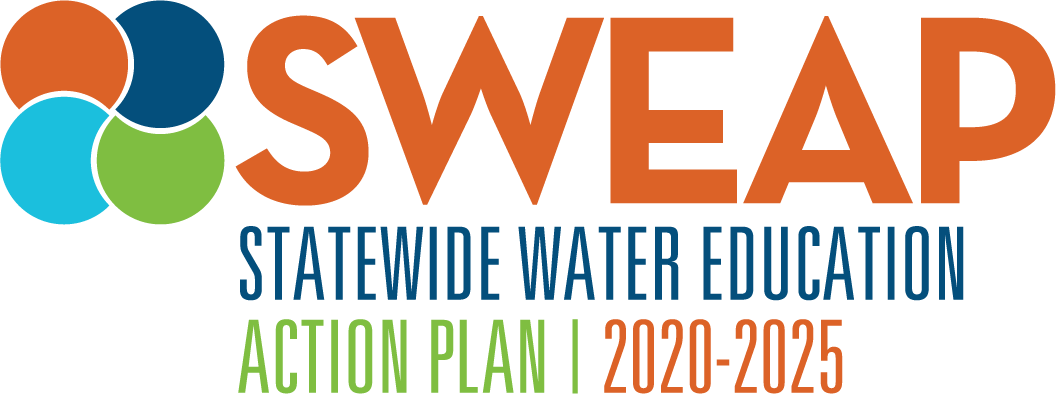WATER EDUCATION IN COLORADO
COLORADO'S DIVERSE WATER EDUCATION COMMUNITY
This Plan recognizes that there are numerous organizations, agencies, and individuals that make up Colorado’s water education community. It is intended to help guide the efforts of all water educators in the categories described in the Colorado Water Plan (CWP) and more!
Each of these entities serves unique audiences, possesses distinct skills and expertise, and represents different perspectives relative to water. While this Plan does not outline, compare or contrast the numerous activities carried out by Colorado’s diverse group of water educators, it is intended to establish a common agenda that can be promoted through activities and projects that are customized for different audiences.
Each of these entities serves unique audiences, possesses distinct skills and expertise, and represents different perspectives relative to water. While this Plan does not outline, compare or contrast the numerous activities carried out by Colorado’s diverse group of water educators, it is intended to establish a common agenda that can be promoted through activities and projects that are customized for different audiences.
|
2020 WATER EDUCATION SITUATION
Water education in Colorado is highly localized and decentralized. With diverse interests, audiences and resources, it tends toward a fragmented, poorly coordinated approach when it comes to realizing statewide impact.
In 2008, the Colorado Water Education Task Force assessed the status of water education in Colorado. The resulting report included nine recommendations that are all important precursors to SWEAP. The Task Force’s final recommendation called for the creation of a detailed action plan. SWEAP is the framework of this plan. In addition, the Task Force recommended fostering collaborative opportunities among water educators, which led to the establishment of the Water Educator Network, coordinated by Water Education Colorado. The Water Educator Network has included more than 100 educators from different institutions across Colorado since 2014. The Network has fostered good communication and strong partnerships among water educators, yet certain limitations to understanding and sharing of best practices remain.
Research by the One World One Water Center (Water Education Asset Map, 2018) and others finds that funding, staffing, skills, and access to resources is either lacking or highly variable around the state. Some educators are also constrained by a lack of clarity about how to connect specific strategies to vision and outcomes for their work. Without clear outcomes, it is difficult to define and track the metrics that are critical to documenting success and return on investment.
In addition, feedback from both formal and non-formal educators consistently stresses the importance of educating youth and engaging licensed professional educators, with their students, in actively promoting water education and action. To this end, SWEAP recognizes the necessity of strong support from the Colorado Department of Education and the importance of incorporating water literacy as part of implementation of Colorado Academic Standards. The invitation from, and participation of, local schools and school districts is also critical to successful implementation of SWEAP.
Greater clarity on the desired impact and outcomes will enable water educators to more easily and confidently convey the value of their work in connection to the greater whole. This will help them attract the necessary financial and policy support to ensure they have sufficient resources, tools, and expertise to achieve important water education outcomes.
In 2008, the Colorado Water Education Task Force assessed the status of water education in Colorado. The resulting report included nine recommendations that are all important precursors to SWEAP. The Task Force’s final recommendation called for the creation of a detailed action plan. SWEAP is the framework of this plan. In addition, the Task Force recommended fostering collaborative opportunities among water educators, which led to the establishment of the Water Educator Network, coordinated by Water Education Colorado. The Water Educator Network has included more than 100 educators from different institutions across Colorado since 2014. The Network has fostered good communication and strong partnerships among water educators, yet certain limitations to understanding and sharing of best practices remain.
Research by the One World One Water Center (Water Education Asset Map, 2018) and others finds that funding, staffing, skills, and access to resources is either lacking or highly variable around the state. Some educators are also constrained by a lack of clarity about how to connect specific strategies to vision and outcomes for their work. Without clear outcomes, it is difficult to define and track the metrics that are critical to documenting success and return on investment.
In addition, feedback from both formal and non-formal educators consistently stresses the importance of educating youth and engaging licensed professional educators, with their students, in actively promoting water education and action. To this end, SWEAP recognizes the necessity of strong support from the Colorado Department of Education and the importance of incorporating water literacy as part of implementation of Colorado Academic Standards. The invitation from, and participation of, local schools and school districts is also critical to successful implementation of SWEAP.
Greater clarity on the desired impact and outcomes will enable water educators to more easily and confidently convey the value of their work in connection to the greater whole. This will help them attract the necessary financial and policy support to ensure they have sufficient resources, tools, and expertise to achieve important water education outcomes.

